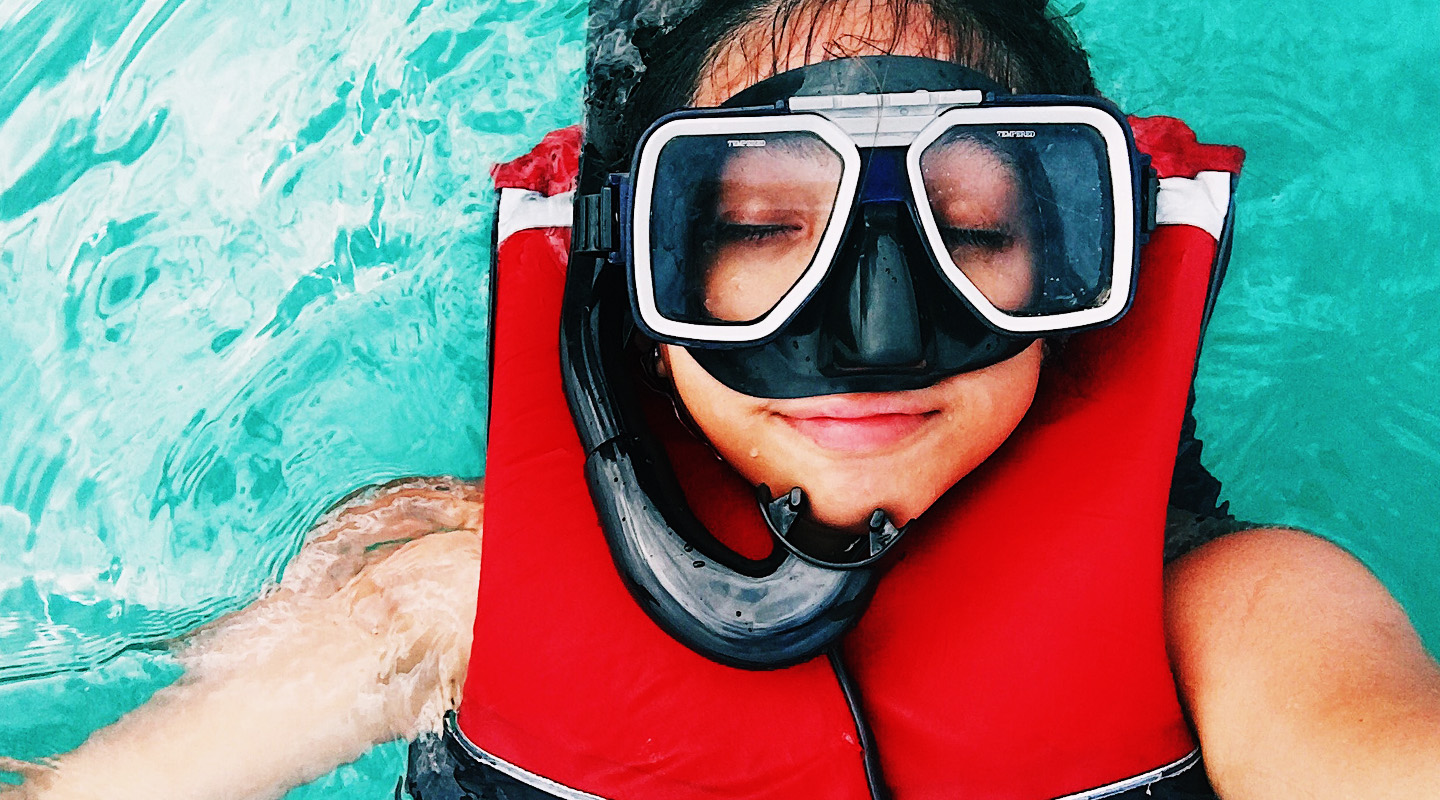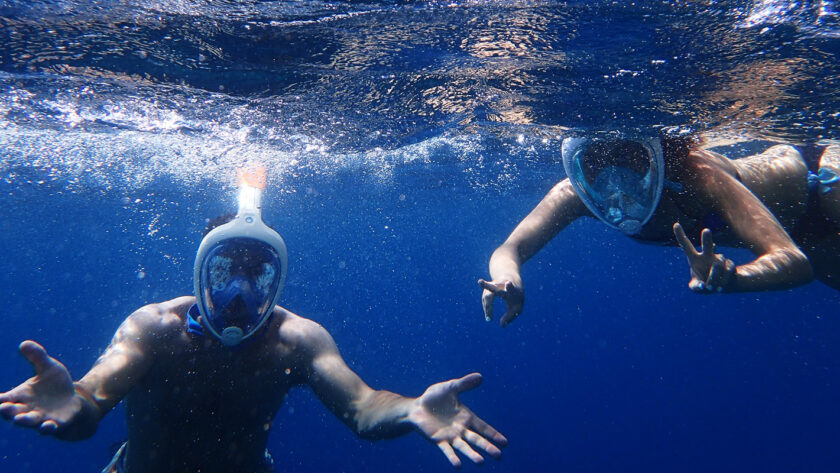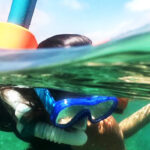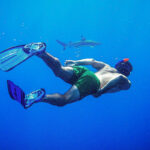Are you interested in snorkeling but worried that your lack of swimming skills might hold you back? Fret not! Contrary to popular belief, you don’t need to be a strong swimmer to enjoy the wonders of snorkeling. With the right equipment, guidance, and a little confidence, even novice swimmers can have a fantastic time exploring the vibrant underwater world. So put on your snorkel mask, slip into the water, and get ready to embark on an unforgettable aquatic adventure!

What is Snorkeling?
Snorkeling is a popular water activity that allows you to explore the underwater world while staying close to the surface. It involves wearing a mask and snorkel to breathe through, while your body is submerged in the water. With the help of fins, you can effortlessly navigate through the water and observe the vibrant marine life beneath you. Snorkeling is a great way to experience the beauty of the ocean and connect with nature, even if you are not a strong swimmer.
Understanding Snorkeling Equipment
Before you embark on your snorkeling adventure, it’s important to familiarize yourself with the essential equipment you will need.
Snorkel
The snorkel is a tubular device that allows you to breathe while your face is in the water. It typically consists of a mouthpiece, a barrel, and a splash guard or purge valve. The mouthpiece should fit comfortably in your mouth, while the barrel should be long enough to extend above the water surface, ensuring easy breathing. Some snorkels come with a purge valve, which allows you to easily expel any water that enters the snorkel.
Mask
The mask is another crucial piece of equipment that allows you to see clearly underwater. It covers your eyes and nose, creating an airtight seal to avoid water leakage. When choosing a mask, make sure it fits snugly on your face and doesn’t obstruct your vision. Opt for a mask with a wide field of view to enhance your snorkeling experience.
Fins
Fins, also known as flippers, are worn on your feet to provide propulsion and improve your maneuverability in the water. They come in different styles and sizes, so it’s important to choose a pair that fits securely and is comfortable to wear. Fins with adjustable straps allow for a customized fit. Practice kicking with your fins on land before entering the water to become accustomed to the extra power they provide.
Life Jacket
While a life jacket is not a standard piece of snorkeling equipment, it can provide an extra layer of safety, especially for non-swimmers. A life jacket will keep you afloat, even if you are not proficient in swimming. It is advisable to wear a life jacket if you are unsure of your swimming abilities or if you are snorkeling in deep or unfamiliar waters.
Safety Considerations
Snorkeling can be a fun and enjoyable activity, but it’s important to prioritize safety while exploring the underwater world. Here are some essential safety considerations to keep in mind:
Knowing Your Limits
It’s crucial to be aware of your swimming abilities and not push yourself beyond your comfort level. If you are not a strong swimmer, stay in shallow, calm waters where you can easily touch the bottom or reach safety if needed. Don’t venture too far from the shore or boat and always listen to your body’s signals.
Snorkeling with a Buddy
Snorkeling with a buddy is not only more enjoyable but also adds an extra layer of safety. Having someone by your side ensures that you can watch out for each other and provide assistance if needed. It’s always better to have someone there to support you, especially if you are not a strong swimmer.
Choosing Calm Waters
When snorkeling, it’s important to choose areas with calm waters. Strong currents and rough waves can be challenging, even for experienced swimmers. Look for protected bays, coves, or designated snorkeling areas where the water is calmer. This will make your snorkeling experience more relaxing and reduce the risk of accidents.
Being Aware of Surroundings
It’s essential to be aware of your surroundings while snorkeling. Keep an eye out for boats, jet skis, or other watercraft that may be present in the area. Avoid snorkeling in areas with heavy boat traffic to minimize the risk of collisions. Additionally, be cautious of sharp rocks, coral reefs, or any other underwater obstacles that may pose a danger.
Using Flotation Devices
Using flotation devices, such as life jackets or float vests, can provide added buoyancy and increase your confidence in the water. This is especially beneficial for non-swimmers or those who lack confidence in their swimming abilities. A flotation device ensures that you stay afloat, making snorkeling a safer and more enjoyable experience.
Building Swimming Skills
While it is possible to snorkel without being a strong swimmer, having basic swimming skills can greatly enhance your snorkeling experience. Here are some swimming techniques you can practice to improve your skills:
Basic Swimming Techniques
Learning basic swimming techniques, such as freestyle or breaststroke, can increase your comfort level in the water. These strokes will help you move efficiently and effectively, giving you better control of your body while snorkeling.
Floating and Treading Water
Floating and treading water are important skills to learn, especially if you find yourself in deep water. Being able to relax and float on your back or tread water without panicking can provide a sense of security and allow you to focus on the beauty of the underwater world.
Breathing Control and Relaxation
Practicing breathing control and relaxation techniques can help conserve your energy while snorkeling. A calm and controlled breathing pattern will prevent hyperventilation and increase your comfort in the water. Focus on steady inhales and exhales, allowing yourself to relax and enjoy the experience.
Increasing Distance and Stamina
As you become more comfortable in the water, gradually increase your swimming distance and stamina. Start by swimming short distances and gradually build up to longer distances. This will not only improve your cardiovascular fitness but also enhance your snorkeling endurance.

Snorkeling Techniques for Non-Swimmers
If you are a non-swimmer or lack confidence in your swimming abilities, there are still snorkeling techniques that you can utilize to enjoy the underwater world:
Surface Snorkeling
Surface snorkeling is a technique where you float face down on the water’s surface, allowing the snorkel to stay above the waterline. This technique allows you to observe the beauty of the underwater world without the need to swim or dive. You can simply kick your legs to propel yourself forward while focusing on the stunning aquatic life beneath you.
Using a Floating Device
Using a floating device, such as a pool noodle or inflatable raft, can provide extra buoyancy and support for non-swimmers. By holding onto the device, you can comfortably float on the water’s surface while enjoying the sights below. This allows you to experience snorkeling without the need for advanced swimming skills.
Snorkeling with a Guide or Instructor
If you are new to snorkeling or lack confidence, snorkeling with a guide or instructor is highly recommended. These professionals are trained to assist and guide snorkelers of all skill levels. They can provide valuable tips, ensure your safety, and even help you overcome any fears or apprehensions you may have about snorkeling.
Training Programs for Non-Swimmers
If you are interested in snorkeling but are a non-swimmer, there are training programs available to help you develop the necessary skills and confidence to enjoy this activity. Some of the programs you can consider are:
Snorkeling Lessons
Snorkeling lessons are designed to teach beginners the basic techniques and safety protocols of snorkeling. These lessons are conducted by experienced instructors who will guide you through the process of using snorkeling equipment, breathing techniques, and proper underwater observation. They will also ensure that you understand the potential risks and how to manage them.
Water Safety Courses
Water safety courses are comprehensive programs that cover different water-related activities, including snorkeling. These courses provide a broader understanding of water safety, helping you develop the necessary skills to stay safe in aquatic environments. It is important to have a solid foundation in water safety before attempting snorkeling, especially if you are a non-swimmer.
Swimming Classes
Taking swimming classes is a great way to build your confidence and swimming skills. Many swimming classes cater to adults who are non-swimmers or have limited swimming abilities. These classes will teach you the fundamental techniques needed to swim comfortably and confidently in the water, improving your overall snorkeling experience.

Choosing Snorkeling Destinations
When deciding on a snorkeling destination, it’s important to consider factors such as water clarity, marine life diversity, and safety. Here are some types of snorkeling destinations that are suitable for both swimmers and non-swimmers:
Shallow Reefs and Lagoons
Shallow reefs and lagoons are ideal for snorkelers of all skill levels. These areas are usually protected from strong currents and waves, offering calm and clear waters for snorkeling. The shallow depth allows you to easily touch the seabed or stand up if needed, providing added reassurance for non-swimmers.
Protected Bays and Coves
Protected bays and coves offer a sheltered environment that is perfect for snorkeling. These areas are usually calm and have minimal currents, making them suitable for non-swimmers. They often provide easy access from the shore, allowing you to gradually enter the water and explore at your own pace.
Snorkeling Tours and Excursions
Joining a snorkeling tour or excursion can be a great option, especially if you are a non-swimmer. These tours are led by experienced guides who will take you to snorkeling spots that are safe and suitable for all skill levels. They provide the necessary equipment and ensure your safety throughout the excursion, allowing you to relax and enjoy the experience.
Other Water Activities for Non-Swimmers
If snorkeling proves to be challenging or you simply want to try something different, there are other water activities that you can enjoy:
Glass Bottom Boat Tours
Glass bottom boat tours allow you to observe the underwater world without getting in the water. These boats have large windows or a transparent bottom, offering a stunning view of the marine life beneath the surface. It’s a great alternative for non-swimmers who still want to experience the beauty of the ocean.
Snorkeling Catamaran Cruises
Snorkeling catamaran cruises combine the luxury of a catamaran cruise with the opportunity to snorkel. These cruises typically have experienced guides who will assist you with snorkeling, making it suitable for non-swimmers. You can relax on the catamaran while taking in the beautiful coastal scenery, and then enjoy snorkeling in calm waters.
Underwater Sea Walks
Underwater sea walks are a unique and exciting activity that allows you to explore the underwater world without the need for swimming or snorkeling skills. With the help of a helmet connected to an oxygen supply on the surface, you can walk on the seabed and interact with various marine creatures. It’s a thrilling adventure that is accessible to non-swimmers.
Potential Risks and Precautions
Despite the many joys of snorkeling, it’s important to be aware of potential risks and take necessary precautions to ensure a safe experience:
Water-Related Accidents
Water-related accidents, such as currents, undertows, or unexpected swells, can pose a risk to snorkelers. Always check the weather and water conditions before entering the water. If you notice strong currents or rough waves, it’s best to postpone your snorkeling adventure for another day. Stay mindful of any sudden changes in water conditions and adjust your plans accordingly.
Sunburn and Heat Exhaustion
Spending extended periods in the water can expose your skin to intense sunlight, leading to sunburn. Apply a waterproof sunscreen with a high SPF and reapply frequently, even if it claims to be long-lasting. Additionally, stay hydrated and take breaks in shaded areas to prevent heat exhaustion or dehydration.
Marine Life Hazards
While most marine life is harmless, some species can pose a threat if provoked or mishandled. Avoid touching or closely approaching any marine creatures, especially those with spines or venomous properties. It’s important to respect their natural habitat and observe from a safe distance.
Proper Precautions and Medical Considerations
Ensure that you have the necessary travel insurance that covers water activities, including snorkeling. Be aware of any pre-existing medical conditions that may impact your ability to snorkel safely. Always consult with your healthcare provider before participating in any water activities if you have concerns about your health.
Conclusion
Snorkeling is an exciting and accessible water activity that can be enjoyed by both swimmers and non-swimmers. With the right equipment, safety measures, and training programs, non-swimmers can overcome their apprehensions and experience the wonders of the underwater world. By choosing suitable snorkeling destinations and considering alternative water activities, non-swimmers can still enjoy unique and memorable experiences in the ocean. Remember to prioritize safety, follow the necessary precautions, and have fun exploring the beautiful marine life that awaits you.




